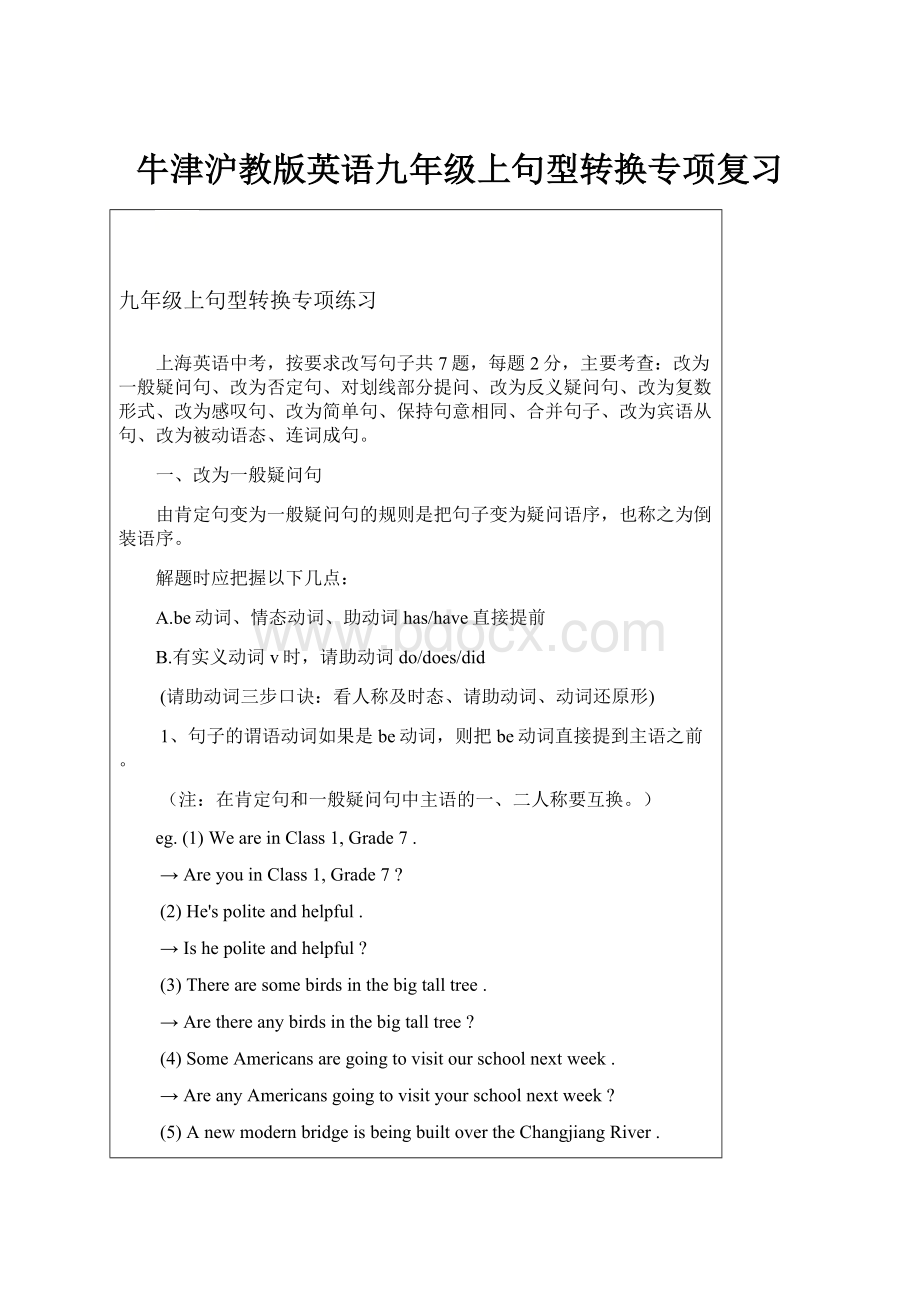牛津沪教版英语九年级上句型转换专项复习.docx
《牛津沪教版英语九年级上句型转换专项复习.docx》由会员分享,可在线阅读,更多相关《牛津沪教版英语九年级上句型转换专项复习.docx(22页珍藏版)》请在冰豆网上搜索。

牛津沪教版英语九年级上句型转换专项复习
九年级上句型转换专项练习
上海英语中考,按要求改写句子共7题,每题2分,主要考查:
改为一般疑问句、改为否定句、对划线部分提问、改为反义疑问句、改为复数形式、改为感叹句、改为简单句、保持句意相同、合并句子、改为宾语从句、改为被动语态、连词成句。
一、改为一般疑问句
由肯定句变为一般疑问句的规则是把句子变为疑问语序,也称之为倒装语序。
解题时应把握以下几点:
A.be动词、情态动词、助动词has/have直接提前
B.有实义动词v时,请助动词do/does/did
(请助动词三步口诀:
看人称及时态、请助动词、动词还原形)
1、句子的谓语动词如果是be动词,则把be动词直接提到主语之前。
(注:
在肯定句和一般疑问句中主语的一、二人称要互换。
)
eg.
(1)WeareinClass1,Grade7.
→AreyouinClass1,Grade7?
(2)He'spoliteandhelpful.
→Ishepoliteandhelpful?
(3)Therearesomebirdsinthebigtalltree.
→Arethereanybirdsinthebigtalltree?
(4)SomeAmericansaregoingtovisitourschoolnextweek.
→AreanyAmericansgoingtovisityourschoolnextweek?
(5)AnewmodernbridgeisbeingbuiltovertheChangjiangRiver.
→IsanewmodernbridgebeingbuiltovertheChangjiangRiver?
2、句子的谓语动词中如果有情态动词,则把情态动词直接提到主语之前。
eg.
(1)Theycanparktheircarsinfrontofthesupermarket.
→Cantheyparktheircarsinfrontofthesupermarket?
(2)I'dlikesomemoredumplings.
→Wouldyoulikesomemoredumplings?
(3)Childrenmustbekeptawayfromfire.
→Mustchildrenbekeptawayfromfire?
3、句子的谓语动词如果是现在完成时或过去完成时,则把时态中的助动词have、has或had提到主语之前即可。
eg.
(1)Ihavefinishedreadingtheinterestingbook.
→Haveyoufinishedreadingtheinterestingbook?
(2)Theoldwomanhadbeendeadbeforeherdaughterarrived.
→Hadtheoldwomanbeendeadbeforeherdaughterarrived?
4、句子的谓语动词如果是行为动词的一般现在时或一般过去时,在改为一般疑问句的时候,根据主语的人称和单、复数,需要添加助动词do、does或did。
eg.
(1)Weenjoythefootballmatchesverymuch.
→Doyouenjoythefootballmatchesverymuch?
(2)Hermotherdoessomecleaningeverymorning.
→Doeshermotherdosomecleaningeverymorning?
(3)Shewenttoseeherdoctoryesterday.
→Didshegotoseeherdoctoryesterday?
注:
在添加了助动词的一般疑问句中,行为动词一律为动词原形。
67.TheEnglishstudentsandteachershadapartylastFridayevening".(普陀)
theEnglishstudentsandteachersapartylastFridayevening?
67.Theydosomehomeworkintheclassroombeforetheyleaveschool.(松江)
________theydo_________homeworkintheclassroombeforetheyleaveschool?
67.Wehaveaclassmeetingonceaweek.(浦东)
youaclassmeetingonceaweek?
67.Allofusrealizetheimportanceofkeepingtheairclean.(嘉定)
_______allofyou_______theimportanceofkeepingtheairclean?
67.SteveJobsandSteveWozniakcreatedApplein1976.(黄浦)
SteveJobsandSteveWozniakApplein1976.
68.Tomsentabirthdaycardtohisgrandpalastweek.(宝山)
Tomabirthdaycardtohisgrandpalastweek?
67.TheRedCrossprovidedsomemedicalservicestothevictimsindanger.(虹口)
theRedCrossprovidemedicalservicestothevictimsindanger?
67.TimhasalreadyenjoyedtheFrenchclassicmusicalNotredeParis.(闸北)
_____TimenjoyedtheFrenchclassicmusicalNotredeParis_____?
二、改为否定句
由肯定句变为否定句的规则是在句中的助动词之后添加否定词not。
1、be动词、情态动词、助动词直接+not
(除了be动词的am词形外,否定词not可以和助动词缩写为“助动词+n't”。
)
2、有实义动词v时,请助动词do/does/did+not
(请助动词三步口诀:
看人称、请助动词、动词还原形)
分别可以缩写为don't、doesn't和didn't。
注:
在行为动词一般现在时和一般过去时的否定句中,行为动词也一律为动词原形。
eg.
(1)HeisfromEngland.
→Heisn'tfromEngland.
(2)TheycanlookforthingsontheInternetinComputerlessons.
→Theycan'tlookforthingsontheInternetinComputerlessons.
(3)Hisbrotheroftenplaysfootballafterschool.
→Hisbrotherdoesn'toftenplayfootballafterschool.
(4)Mygrandmacamefordinneryesterdayevening.
→Mygrandmadidn'tcomefordinneryesterdayevening.
(5)Ihaveseentheinterestingfilmalready.
→Ihaven'tseentheinterestingfilmyet.
★注意:
(1)Ithink+宾语从句。
该句型在变为否定句时,否定词not应放在主句上,
即为:
Idon'tthink+宾语从句。
eg.Ithinkitwillraintomorrow.
→Idon'tthinkitwillraintomorrow.
(2)祈使句
祈使句的特征是没有主语,以动词原形开头。
祈使句在变为否定句时,应在动词原形之前添加助动词don't.
eg.
(1)Watertheflowers.
→Don'twatertheflowers.
(2)Pleasecleantheblackboard.
→Pleasedon'tcleantheblackboard.
67.Thereissomefoodanddrinksinthefridge.(虹口)
Thereisfooddrinksinthefridge.
67.LilyhadagoodtimeduringherstayinBeijing.(杨浦)
Lily________________agoodtimeduringherstayinBeijing.
67.Theybothareeditorsoftheschoolnewspaper.(嘉定)
_____ofthem______aneditoroftheschoolnewspaper.
67.Jerryhastoworkhardtofeedhislargefamily.(浦东)
Jerry_____________toworkhardtofeedhislargefamily.
67.Youcanleaveyourbaginyourcarwhenyougoshoppinginthesupermarket.(普陀)
You______________yourbaginyourcarwhenyougoshoppinginthesupermarket.
67.WewatchedanexitingfootballmatchonTVlastnight.(徐汇)
We______________anexcitingfootballmatchonTVlastnight.
67.Susanhasagoodtimeonherbirthdayeveryyear.(松江)
Susan__________agoodtimeonherbirthdayeveryyear.
67.Henryputonhisscarfbeforehelefttheoffice.(青浦)
Henry____________________onhisscarfbeforehelefttheoffice.
67.BothmybrotherandIlikethissong.(静安)
mybrotherIlikethissong.
67.Thegirlhasalreadyfinishedtheprojectherself.(奉贤)
Thegirlfinishedtheprojectherself.
三、改为复数形式
句子的单复数转换的规则是:
对应句中的名词、代词、动词等,能变则变,不能变的,要么保留,要么去掉。
在解题过程中,还必须具体情况具体对待。
eg.
(1)ThegirlisfromEngland.
→ThegirlsarefromEngland.
(2)Heisapoliteandhelpfulboy.
→Theyarepoliteandhelpfulboys.
上述例句中,划线的为能变的,没划线的为该保留的,a(an)为该去掉的。
反之,在由复数变为单数时,则要根据句意在名词之前补上一个a(an)。
eg.TheyareEnglishgirls.→SheisanEnglish.
但是对于"Therebe"句型,单复数转换时句中的a/an不能去掉,而要根据句式将其与some或any互换。
eg.
(1)Thereisaboatonthelake.
→Therearesomeboatsonthelake.
(2)Thereisn'tatreebehindthehouse.
→Therearen'tanytreesbehindthehouse.
(3)Isthereapetdoginyourhome?
→Arethereanypetdogsinyourhome?
(4)Therearen'tanypicturesonthewallofourclassroom.
→Thereisn'tapictureonthewallofourclassroom.
Thisismybook.(奉贤)
____________________mybooks.
四、对句中的划线部分提问
解该题型可使用“三步提问法”。
具体步骤如下:
1、先选择一个合适的疑问词。
英语中主要的疑问词有:
what,who,when,whose,where,why,which,how,howold,howmany,howmuch,howlong,howoften,howsoon,howfar,等。
疑问词的确定要根据句中的划线部分作什么成分。
上述疑问词的用法主要为:
what:
用来询问事物、人的姓名和职业。
另外,和不同的词一起使用还可询问具体的方面,
whattime询问时间,
whatcolour询问颜色等。
who:
用来询问人,尤其指人与人之间的关系。
whose:
用来询问归属,即和人之间的所有关系。
when:
用来询问时间,一般指较大的时间范围。
(时间点可用whattime)
where:
用来询问地点。
which:
用来询问哪一个,主要针对名词的定语提问。
why=what...for:
用来询问原因,或目的,主要对because,todosth,forsth.
how:
用来询问方式、程度,主要对by...提问。
howold:
用来询问年龄。
howmany:
用来询问可数名词的数量,其后要接名词的复数形式,主要对数字提问。
howmuch:
用来询问不可数名词的数量,其后要接不可数名词。
如单独使用则表示询问多少钱或对事物了解或喜欢的程度。
howlong:
用来询问事物的长度或时间长度,主要对for+一段时间或一段时间提问。
howoften:
用来询问某件事或某个动作在一定的时间范围内重复发生的次数,即频度。
howsoon:
用来询问将来的情况,一般与将来时态连用,主要对in+一段时间提问。
howfar:
用来询问空间距离。
2、把原句变为一般疑问句。
3、把确定的疑问词放在句首,其后跟上一般疑问句的语序,把划线部分省略即可。
注:
如果句中的划线部分是主语或主语的定语,则可用疑问词直接替换而不用一般疑问句的语序。
68.Thebosswillhaveaface-to-facetalkwithhimnextweek.(松江)
thebosshaveaface-to-facetalkwithhim?
69.Thenewmobilephonecosthimfourthousandyuan.(虹口)
moneydidthenewmobilephonecosthim?
68.LucywillleaveforLondononbusinessinthreedays.(奉贤)
____________willLucyleaveforLondononbusiness?
70.Theladyputsomegoldintheshoetwentyyearsago.(嘉定)
_________________theladyputsomegoldtwentyyearsago?
68.Helikesreadingthebookbecauseitisapresentfromhisfather.(黄浦)
________________helikereadingthebook?
68.IpaidfivethousandyuanforthisnewiPhone4?
(宝山)
______________didyoupayforthisnewiPhone4?
69.We’vebeenclosefriendssincewemetatschoollastyear.(奉贤)
_______________haveyoubeenclosefriends?
68.Andersonplaystennistwiceaweek.(杨浦)
____________________doesAndersonplaytennis?
68.ADVD-ROMcanholdmillionsofpagesofwriting.(浦东)
pagesofwritingcanaDVD-ROMhold?
69.IttakesMaryaboutonehourtopractiseplayingthepianoeveryday.(普陀)
doesittakeMarytopractiseplayingthepianoeveryday?
68.TwopandasfromChinawillstayinaBritishzoofortenyears.(闸北)
willtwopandasfromChinastayinaBritishzoo?
70.Youngpeoplecanlearnalotbykeepingapetdog.(徐汇)
__________youngpeoplelearnalot?
五、改为反义疑问句
组成:
前一部分是一个陈述句,后一部分是一个简短的疑问句(be动词/情态动词/助动词+主语),两部分的人称时态应保持一致,遵循“前否后肯,前肯后否”的原则。
1.当陈述部分的主语是I,everyone,everything,nobody,this,those时,后面的疑问句应表示为:
Iamastudent,aren’tI
Everyoneisintheclassroom,aren’tthey?
Everythingbeginstogrowinspring,doesn’tit?
Nobodywillgo,willthey?
Thisisyourbook,isn’tit?
Thoseareherbooks,aren’tthey?
2.当陈述部分有never,no,seldom,hardly,few,little,barely,rarely,scarcely,nothing,nobody等否定词时,后面的疑问句用肯定(否定前缀不能视为否定词):
Therearefewapplesinthebasket,arethere?
Hecanhardlyswim,canhe?
Theyseldomcomelate,dothey?
3.当陈述部分是主从复合句,一般与主句一致,
Hesaidhewasill,didn’the?
但是Ithink,believe,expect,suppose,imagine加从句时,疑问句应和从句的人称时态保持一致。
Ithinkchickenscanswim,can’tthey?
IthinkLucyisagoodgirl,isn’tshe?
Ididn'tthinkhewashappy,washe?
4.陈述部分有hadbetter时,疑问句应用hadn’t开头:
you’dbettergetupearly,hadn’tyou?
5.当陈述部分是祈使句时,疑问句要根据语气来表达
Let’sgooutforawalk,shallwe?
Letusgoourforawalk,willyou?
Turnontheradio,willyou?
6.含有oughtto的反意疑问句,陈述部分是肯定的,疑问部分用shouldn't/oughtn't+主语。
Heoughttoknowwhattodo,oughtn'the /shouldn'the?
7.陈述部分有haveto+v.(hadto+v.),疑问部分常用don't+主语(didn't+主语)。
Wehavetogetthereateighttomorrow,don'twe?
8.陈述部分的谓语是usedto时,疑问部分用didn't/usedn't+主语。
Heusedtotakepicturesthere,didn'the /usedn'the?
9.感叹句中,疑问部分用be+主语。
Whatcolours,aren'tthey ?
Whatasmell,isn'tit ?
10.陈述部分是"therebe"结构的,疑问部分用there省略主语代词。
Thereissomethingwrongwithyourwatch,isn'tthere ?
There